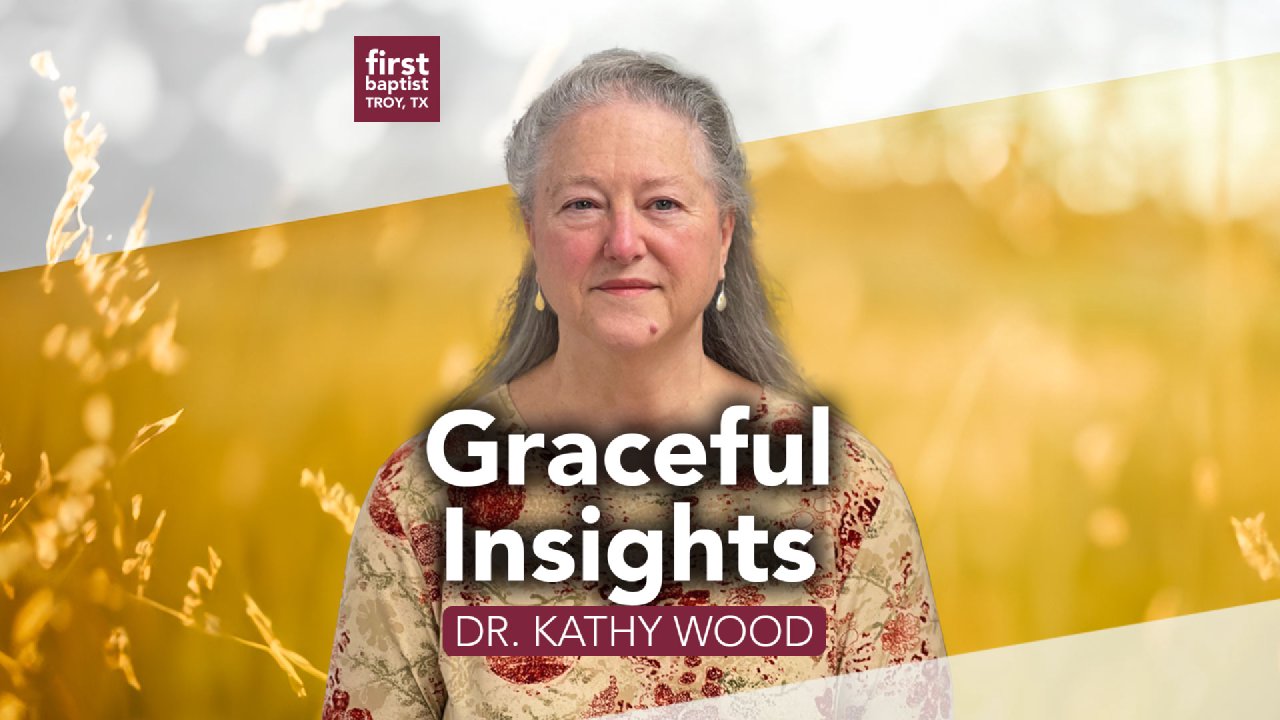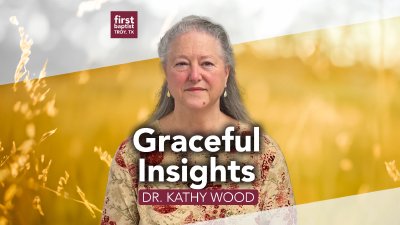Many of us say a blessing before we eat and some of us actually ask God to bless us and other people. But what are we asking for? Is a blessing just some vague set of words before a meal or toward a person? No!
FULL TRANSCRIPT:
One of my favorite Psalms in the Bible is Psalm 103. Here is how it starts: “Bless the Lord, O my soul, and all that is within me, bless His holy name. Bless the Lord, O my soul, and forget not all His benefits.”
The verses after that list some of the things that our God does – some of the things that we should bless God for. Those verses talk about not forgetting all that He has done for us and, since I am prone to forget things, I figure it is a good idea to go over and over and over those things.
As I lay in bed thinking about getting up every morning, it is not unusual, if you could read my mind, to hear these verses flow through my thoughts.
Even in the New Testament of the Bible, there are many references to blessing God. One of them is in Luke 24:53.
The disciples have just seen Jesus, after His resurrection from the dead, ascend into heaven. The disciples go back to Jerusalem rejoicing and verse 53 says “they were continually in the temple blessing God”. They were so excited that this was all they could do! So, what does this word “bless” actually mean?
The Hebrew word is BERAKAH. It means to increase – to increase joy or peacefulness or goodness if it is used toward men.
If it is used toward God, it means an expression of praise or thanks. In Psalm 103, it means we do not hold anything back in our praise and worship of Him – our entire being is praising Him. When it is used to describe how God blesses people, it means “to endow with power for success.”
The Greek word is EULOGEO. It is where we get our English word “eulogy”. It means to praise someone or, if God is doing the blessing, it means to cause a person to prosper or to make them happy.
Blessing God:
Question – Why should we bless God?
Answer – Because we are commanded to bless Him. We are commanded to praise Him, worship Him, exalt Him. As we see the overwhelming beauty of his greatness, how could we not burst out in blessing Him?
Question – How can we bless Someone who lacks nothing? How can we bless God?
Answer – God does not need us to begin with and He does not need anything from us. But He chose us before we ever even knew Him. So, when we bless God we are honoring Him for all that he has done, for His control over all things, for His greatness. That is always appropriate. And it must be a constant part of our relationship with Him. And it must consume our very soul – this is very sobering because most of us are consumed by everything else but this.
Ask yourself this question – if God is who He says He is and if I should be consumed by praise and worship of Him, why am I worried about anything?
Blessing other people:
Numbers 6:22-27 “Then the Lord spoke to Moses, saying, ‘Speak to Aaron and to his sons, saying, “In this way you shall bless the sons of Israel. You are to say to them: The Lord bless you and keep you, the Lord make His face shine upon you, and be gracious to you, the Lord lift up His countenance upon you, and give you peace.”
In these verses, you see that the “blessing” is by God toward his people. If we go back to the definition above, it means that God is asked to bless or increase the security of His people, His favor on His people, His grace toward His people, His peace toward His people. What a wonderful blessing!
Question – So, how can we bless other people?
Answer – A follow-up question to this one is “how does God bless a person”? If we imitate what God does to bless someone, we are making a good start in blessing other people. No, we do not have the power or wisdom to bless people like God does. But there are some ways that we could imitate Him.
For example, maybe you see someone who is sad – God does comfort people when they are sad or troubled so could you comfort that person? Maybe you see someone who has physical needs – God provides what we need so could you share some of what God has given you to help that person?
So, think about all the ways that God blesses you and ask Him how you could do the same for other people. He knows exactly what they need and you may be the one He has given the ability to meet that need and bless that person.
Question – Why should we bless other people? OR How does blessing another person affect you?
Answer – Look at this verse out of the book of Proverbs. Proverbs 11:25 says “the one who blesses others is abundantly blessed; those who help others are helped.” So God helps and blesses those who bless other people. And He blesses them “abundantly”, even more than the blessing that they have given to others.
Question – So, how do blessings work?
Answer – This is a good question. How can just saying a blessing for somebody else make a difference in their life? Aren’t these just “words”? No! When we offer words of blessing to someone, we are actually praying – talking to God – and asking Him to give them favor. God is really the source of all blessing.
Sometimes I really don’t know what another person needs but I do know that that person needs God’s favor. So I ask Him to bless them in any way that He sovereignly knows that they need.
So, speaking of God really being the one who does the blessing, let’s briefly look at… Some other verses that talk about God blessing people or, putting this a different way, how a person can be blessed:
Deuteronomy 30:16-20 “I [Moses] command you today to love the Lord your God, to walk in His ways and to keep His commandments and His statutes and His judgments, that you may live and multiply, and that the Lord your God may bless you in the land where you are entering to possess it. 17 But if your heart turns away and you will not obey, but are drawn away and worship other gods and serve them, 18 I declare to you today that you shall surely perish. You will not prolong your days in the land where you are crossing the Jordan to enter [v]and possess it. 19 I call heaven and earth to witness against you today, that I have set before you life and death, the blessing and the curse. So choose life in order that you may live, you and your [w]descendants, 20 by loving the Lord your God, by obeying His voice, and by holding fast to Him; for [x]this is your life and the length of your days,”
Question – So, how can a person be blessed by God? What did He say?
Answer – By loving God, by obeying God, and by clinging to Him. This next verse is similar.
Jeremiah 17:7 “Blessed are those who trust in the Lord and have made the Lord their hope and confidence.” God says He will bless those who trust Him.
Question – What is this verse really saying?
Answer – That we can expect – expect – God to bless us if we choose to trust Him with everything. God’s blessing is up to Him. He knows what form the blessing needs to take and He can be counted on to do what is perfectly right toward you in every case. That is why He becomes that person’s hope and confidence.
Here is another similar one – Matthew 11:6 “And blessed is any person who does not take offense at Me.” – Jesus said this in response to some questions about John the Baptist. John had sent some of his disciples to Jesus to ask Jesus if He was really the one they were looking for, the Messiah. This verse is essentially saying that if a person believes that Jesus is who He says He is, that person is blessed.
And finally, this next verse in Acts 3:26 “God raised up His Servant for you 1st, and sent Him to bless you by turning every one of you from your wicked ways.”
This verse talks about another way God blesses people – He works in their hearts to turn them away from evil so that they can turn to Him and be saved.
This topic on blessing is a little different for me because defining a blessing is difficult, as far as I am concerned. When I ask God to bless someone, a lot of the time I don’t know exactly what I am asking! I just know that God knows what that person needs and I am asking Him to carry out what He already knows that person needs. And then when I think about blessing God, what an awesome opportunity I have to exalt the greatest Person in all creation and outside of creation. If you think about it, it is actually a great gift God has given us to be allowed to bless Him. He doesn’t need my blessing. He is complete without it. But He has granted us – me – the privilege of blessing Him.
Wow.





